The Amazon Deal Won’t Save The USPS By Itself, But It’s A Start
Amazon's new deal with the USPS offers a way out of the agency's problems if only Congress would give up its last bit of control.
As I’ve discussed here several times in the past, the United States Postal Service is in serious financial trouble. Thanks in part to pension burdens placed upon it by Congress and in part by the simple fact that mail volume continues to decline as people shift to electronic correspondence and electronic bill payment, the quasi-independent agency has been losing hundreds of millions of dollars per quarter for some time now. Moreover, it is hampered in its ability to respond to these developments as any ordinary business would by the fact that it still remains under Congressional control in several significant respects. For example, when the service announced earlier this year that it intended to cut costs by eliminating Saturday delivery, Congress immediately stepped in to prevent that from happening and the plan was dropped. At the same time, of course, Congress did nothing to address any of the USPS’s underlying financial problems and the losses continue.
That’s why a newly announced deal with Amazon is so interesting:
WASHINGTON — The cash-short United States Postal Service, which has failed to win congressional approval to stop delivering mail on Saturdays to save money, has struck a deal with the online retailer Amazon.com to deliver the company’s packages on Sundays — a first for both, with obvious advantages for each.
For the Postal Service, which lost nearly $16 billion last year, first-class mail delivery, particularly on Saturdays, is often a money loser, whereas package delivery is profitable.
The deal, announced on Sunday and taking effect immediately, in time for the holiday shopping season, gives the Postal Service a chance to take some business from United Parcel Service and FedEx, which do not deliver on Sundays. Now, some orders that would have been handled by either of those carriers for Monday delivery will go through the Postal Service and arrive on Sunday.
The Postal Service said it expected to make more such deals with other merchants, seeking a larger role in the $186 billion e-commerce market. Amazon.com would not say if it would try to arrange Sunday deliveries with other parcel carriers.
For this holiday shopping season, Sunday delivery of Amazon products will be limited to the Los Angeles and New York metropolitan areas, which in New York’s case includes parts of New Jersey and Connecticut. In 2014 it is expected to expand to other cities including Dallas, Houston, New Orleans and Phoenix.
Among the primary beneficiaries of the new delivery schedule will be Amazon Prime members, who pay an annual fee for premium services including free two-day shipping for certain items, said Kelly Cheeseman, a spokeswoman for Amazon. “Now every day can be an Amazon delivery day,” Ms. Cheeseman said.
Postal Service officials called the agreement an important step in diversifying its services and expanding those that make a profit. “Consumers have shown that there is a market for package deliveries seven days a week, and we are glad to be in a position to partner with Amazon on providing this service,” said Patrick R. Donahoe, the postmaster general.
Neither Amazon nor the Postal Service would disclose financial arrangements or discuss the volume or revenue they expected to generate from Sunday deliveries. The Postal Service already delivers some packages on Sundays and holidays for an extra fee.
Shipping and package services have been one of the few bright spots for the beleaguered Postal Service. First-class mail, its main source of revenue, declined to almost 69 billion pieces last year from nearly 92 billion in 2008.
In many ways, this seems to be an expansion of many of new delivery services that Amazon is offering. In many parts of the country, for example, it’s now theoretically possible to order a product and have it delivered the same day, typically by a local courier service rather than a carrier by USPS, UPS, or FedEx. The expansion to Sunday delivery, which is obviously conveniently timed in its initial limited roll out for the upcoming Christmas shopping season, seems to be a logical extension of that part of Amazon’s business. Additionally, it’s not surprising that Amazon would team up with USPS in this endeavor given the fact that the Postal Service is an operation that is in fact operating around the clock. UPS and FedEx would also seem to be logical partners here, and we may indeed see Amazon make deals with these carriers as it seeks to expand the ability to deliver packages quicker, and at times that in the past would have been unconventional.
Now, it’s unlikely that this deal alone will solve all of the USPS’s financial problems even after it is expanded beyond New York and Los Angeles. Additionally, it seems unlikely that Amazon would be able to offer this service nationwide even with the aide of the USPS’s not inconsiderable infrastructure and transportation network. Most likely, for some time to come, this will be limited to large metropolitan areas and gradually spread out to other cities and their surrounding metro areas. More distant areas would be a much larger logistical challenge. In any event, though, whatever amount of revenue this brings into USPS’s coffers would certainly be better than nothing.
Additionally, though, the deal itself would seem to suggest an entirely new avenue of business for USPS to explore, if it were permitted to do so. In addition to delivering mail across town or across the nation, USPS could become something of a courier service in the manner that these Sunday deliveries seem to imply. The number of businesses that might be open to such a service from an entity that already does an pretty good job of delivering packages around the country. In order to explore that line of business, though, USPS will need to be finally freed from the reins of Congressional control holding it back and limiting its ability to adapt the way any other business would do. It also needs to open itself up to competition, because it’s only by competing against other businesses that an entity can hope to improve its own services. Until that happens, USPS will continue to be the sick man of the quasi-government agency world.
So, yes, this Amazon deal will help the USPS to the extent it brings in new revenue, but truly fixing the agency will require the kind of changes that very few people on Capitol Hill seem willing to make.
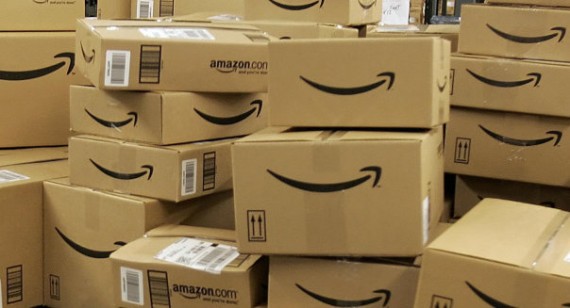


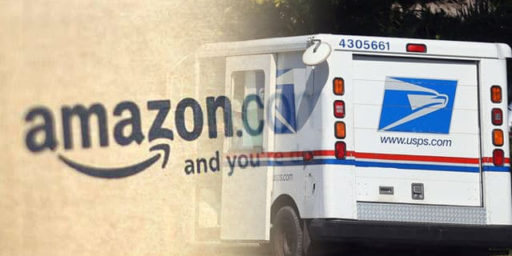
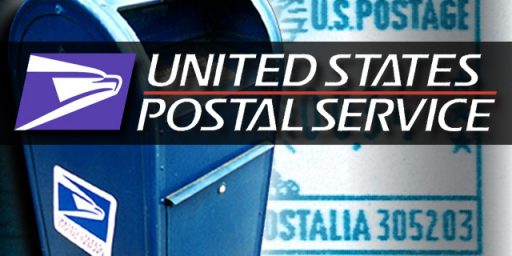
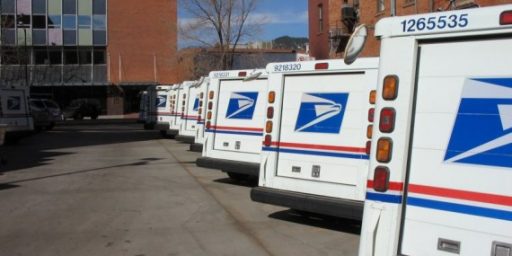
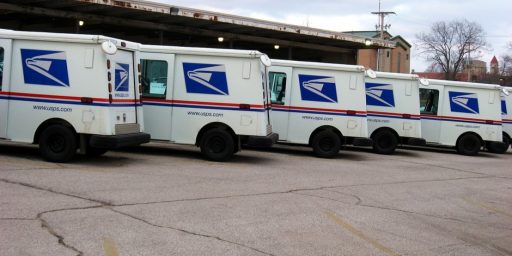
Package service is the future. The USPS has been delivering UPS packages in rural areas for a decade and although I live in a large metropolitan are my smaller UPS packages have been delivered by the USPS for a couple of years. UPS already has facilities that do nothing but transfer packages to the USPS. You really can’t deliver a package via the internet.
The post office here has been doing a lot of “last leg” delivery for UPS here too. I’ve noticed it with some Amazon deliveries. I’m not really in a rural area myself, but the area the P.O. here serves does go out to some fairly rural parts of the county so I guess that makes sense. I expect to see a lot more of that with the Xmas season starting up
It’s pretty simple. Republicans want USPS broken so they can say “government does not work”…
Your point about Congress is spot-on.
But I’ve never actually needed a Sunday delivery. Saturday either for that matter…given the premiums.
@C. Clavin:
It does seem like kind of a “luxury good” in the classic sense. It will be interesting to see how widely used it actually becomes.
If UPS and Fed Ex had, in fact, to deliver on their very own packages to the end destination they’d be charging $500/package.
I think USPS should raise its rates sufficiently for “last mile” deliveries to fill whatever hole exists in its budget. Even if UPS and Fed Ex pass the increased costs on to their customers, it would still be cheaper than what UPS and Fed Ex would have to charge if they did have to do everything on their own.
Or maybe we should start charging more for rural delivery, period. You want to live out in the middle of nowhere, there are costs. Better that you pay them than trying to impose them on the rest of society, right?
“Thanks in part to pension burdens placed upon it by Congress and in part by the simple fact that mail volume continues to decline as people shift to electronic correspondence and electronic bill payment, the quasi-independent agency has been losing hundreds of millions of dollars per quarter for some time now. ”
I’d just like to point out that the pension burdens isn’t part of the problem – it’s all of the problem. If the USPS had the same burden as any comparable government agency, it would be turning a profit.
@grumpy realist:
Well that IS the model for America these days. We are moving away from the idea that we should bear certain costs for the common good, that people in populous areas might subsidize rural regions for many services – transportation, delivery, energy and so forth. People in those rural areas tend to be quite conservative so I’m guessing that they would be quite willing to pay the real (actual) cost of providing services to their areas, right?
@grumpy realist:
I wouldn’t really have a problem with that either but I suspect it might cost more just to figure out who pays how much.
For the record, UPS and FedEx do deliver to some pretty rural places (without relying on USPS). They use USPS when it’s cheaper to do so, but there really isn’t all that much reason to believe that the price differential would be astronomical (they don’t charge an arm and a leg to do so). Such things are built into pricing models for the same reason that satellite and cell phone companies don’t upcharge smaller markets even though they cost more to service on a per-consumer basis. Pricing predictability (either a stable price or a price within range).
If we want to try to equalize the spending/revenue regionally with regard to the USPS, the better way to do so is by time rather than price. At least for first class and commercial mail. Cut delivery to three days a week or once a week or somesuch, but leave the prices the same so that when someone in Atlanta wants to send someone a letter, they don’t have to look up a price chart to see if Bear Lake, Idaho, costs a different amount than Boise.
@al-Ameda: I’m one of those people who likes the concept of the common good so I’d actually like flat rates. What I don’t like is so-called “conservatives” who whine about The Common Good when it comes to paying for it but are all too eager to reap the benefits.
In other words, if you grumble about USPS, then you can pay for your own mail services out to the middle of nowhere. Enjoy paying $300 to get your packages hand-delivered by courier.
I got an Amazon delivery and a mail order pharmacy prescription package delivery today (Veterans Day), both courtesy of the Post Office.
If you really want to see how “business savvy” a congress critter is, just see how they behave when they get dictatorial control over something that requires strong executive (i.e. business) authority such as Amtrak, the Post Office or even the D.C. oversight committee. All three merely serve as whipping boys so some idiot reps and Senators can get their rocks off by yelling at a bureaucrat for the cameras. And their purported business sense is shown as a sham, over and over and over.
@Doug Mataconis:
I think Amazon is trying to create a system where same day and Sunday delivery are not luxuries at all, but rather the norm.
I have amazon prime, and live in a city with a very large distribution center. For goods at that distribution center, I often receive in the afternoon the purchases I ordered in the morning.
Amazon wants to compete with Wal-Mart, Target, etc. A big part of that is the convenience of knowing I will get what I order in a very quick manner. With Sunday delivery, prime is no longer “2 business day” its “2 days period.” Next prime will be free one day delivery, and eventually in the future a large amount of goods will be delivered same day or next morning.
@al-Ameda: “People in those rural areas tend to be quite conservative so I’m guessing that they would be quite willing to pay the real (actual) cost of providing services to their areas, right?”
I wouldn’t count on contemporary conservative thought providing the logic necessary to connect those two dots–rural living and increased service cost (but I suspect you already know that).
Greetings:
I think that they have something similar going on with UPS (aka United Parcel Service). Last week a got a bunch of socks that came across the country vis UPS but my USPS postman brought it to my door.
I’m still sticking with the 3 days a week deliveries recommendation for the rest of my mail receivables. Nothing comes in my mail that requires same or next day responses, mostly bills, ad mail, and magazines. I don’t really come across and serious arguments why we need daily delivery in this technological day and age.
Hopefully, the USPS’s version of President Obama’s Lois Lerner won’t read this and interrupt my deliveries.
@Just ‘nutha’ ig’rant cracker: the usps uses contractors in the stix- they don’t pay/benefit them like they do the normal hacks. and the pensions don’t apply either.
I’ll bet 10 quatloos that some yahoos in Congress try to kill the plans by complaining about USPS employees working on the Sabbath.
Congress doesn’t impose pension burdens. Hiring people who earn pensions does. It’s only fair that Amazon and every other business that is responsible for 90 plus percent of the Postal Service’s business fund Postal Service pensions, instead of passing that bill along to our children. Please stop destroying my children’s future. Now!!!!!!
The thing that may save the USPS is that UPS and FedEx are now dependent on it. The Republicans are already probably hearing from them.
@ Let’s Be Free
Based on the amount of ignorance you were able to jam into one paragraph, I think you children have problems much closer to home than USPS pensions 🙁
@Argon: But an increasing number of folks are home on the Sabbath.
As for packages, one problem I have had from time to time has been deliveries while I was at work and those stickers on the door. Sunday deliveries mean that I can be assured of being home to receive them. Indeed, if I could specify that all of my package deliveries be on Sundays, that would be excellent.
@Let’s Be Free: The issue isn’t paying the pensions. It is being forced to fund at 100% all forecasted healthcare costs in a very short timeframe. My understanding is that most businesses are only at about 20% funding. I can even understand asking a higher percentage from the USPS due to declining mail volumes, but 50% funding would seem to be plenty without bankrupting the whole enterprise.
@Let’s Be Free:
Help me out here: Your children are planning to work for Amazon and you do, or do NOT, want them to have a pension?
Didn’t you know? The NSA already has you under surveillance because of your dissident views…someone will be visiting your home soon to take you away to the re-education camp…
@11B40:
Too late, she’s already asked Allen West to plant IEDs on the roads and on the shoulders of those roads in the hope of pre-empting your regular stops for trans-fat donuts and Mountain Dew.
As a cog in that infrastructure, I would have to disagree. It is that considerable.
The only rates that vary are package rates. Rates based on weight, distance, and speed.
If you’re okay only getting packages 3 days a week. You cannot possibly imagine the volume of letters a carrier would have to deliver if he/she could only carry them 3 days a week.
@Let’s Be Free:
Postal employees hired after 1984 are no longer covered under CSRS, but FERS. We pay for our own retirement. Feel free to educate yourself before blathering on like an idiot.
@Phillip: Thank you and as a rural person I’ll pay more if you city/beltway people will pay more for your food that the farmers in my area grow.
@jo6pac: Who said anything about paying more? I’ll be dead from stress before I get 37 years in!
@Phillip:
Greetings, Philip: (@ Tuesday, November 12, 2013 at 19:19)
Admittedly, this is going from the specific to the general, but I don’t get USPS mail 2 or 3 days a week, so while there is some logic to what concern’s you, I don’t know that it would actually show up on the block. When I first inhabited my current abode, the mail arrived around 5pm. Now it shows up around noon. I can’t recall ever seeing our postpeople terribly burdened.
I have a lot of appreciation for the USPS. Over a handful of decades, I don’t think that I’ve had more than a handful of service failures. I spent most of my worklife in the printing industry so I have a pretty could idea about the complexities of what it does. But, as I learned in my business career, delivering more service than the customer is paying for is a fool’s mission. Bringing service costs down to revenue levels may require a paradigm shift in customer’s thinking, thus, for me, the strategic question is why must mail be delivered six days a week?
@Phillip: The only rates that vary are package rates. Rates based on weight, distance, and speed.
I’m aware. I was addressing the suggestion that we charge more to send mail (including letters) to rural places. I think cutting delivery days is the better way to go (as NZ did with cities). For packages, it makes sense to charge at least a little more for rural areas, as UPS and FedEx do, but within a predictable range (as they are with UPS and FedEx) when possible. (All of this excluding Alaska.)
@Phillip: I was saying Thank You to You for pointing out everything you did. The Rural thing was to everyone else that thinks the country side should pay more. I have nothing but Good things to say about USPS.
I don’t see why because someone decides to go build a house out on a moutaintop way out in the middle of nowhere that automatically entitles them to mail service. Or electricity provided from the power company. I would think it’s perfectly reasonable for the government (or the electric company) to say: “sorry, you’re on your own.” Or: “ok, if you want mail/electricity, you’re going to have to pay ALL of the costs needed to get the service out to you–not just pay the average rate and have us charge the cost of the difference to the taxpayers/other clients.”
Sort of like the stupid bint who couldn’t understand why the local community couldn’t keep the paved road going out to her farm because there were still salaries of the local government bureaucracy to cut, so obviously they had the money.
@jo6pac: I have to agree with you on that. One of the biggest reasons we should resist “privatization” as much as possible, no private corporation will resist the urge to gut rural delivery.
@grumpy realist:
Right, if we can’t make money off of it, we should get rid of it /sarcasm
Americans have more things to be alramed about. Example that the rich keeps getting richer on Wall Street and Stock Market, yet the GOP does nothing about jobs for midddle class and poor folks. Our country is more disunited as 200 years ago and still because of southern states.